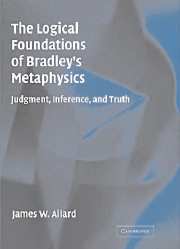Preface
Published online by Cambridge University Press: 04 September 2009
Summary
Despite a recent revival of interest in F. H. Bradley within a small community of analytic philosophers, the feeling persists that Bradley's philosophy and the late-nineteenth-century British Idealism it represents was a weedy exotic – an import from Prussia that stimulated a revolution in philosophy by G. E. Moore and Bertrand Russell, but that has since been rooted out, leaving only faint traces of its passage. This feeling has been reinforced by vast differences between the issues engaging philosophers today and those that engaged nineteenth-century British Idealists, by the current use of mathematical logic in philosophy, and by the widely held belief that constructive work in philosophy consists in solving problems rather than in constructing systems. Less obviously, but perhaps more significantly, it has been further reinforced by concentrating on the metaphysics of the British Idealists at the expense of their logic. Their metaphysics certainly deserves attention. They saw metaphysics as the most significant part of philosophy as well as the only all-encompassing one. Nevertheless, they often found the materials for their metaphysics in logic. In fact, their use of logic as a basis for metaphysics was a new departure in British philosophy, one that has left a lasting mark.
The longest and most influential book on logic written by a British Idealist is Bradley's The Principles of Logic. It is a difficult book, more difficult than Bradley's better-known Appearance and Reality, because of both its greater length and its poorer organization.
- Type
- Chapter
- Information
- The Logical Foundations of Bradley's MetaphysicsJudgment, Inference, and Truth, pp. ix - xviiiPublisher: Cambridge University PressPrint publication year: 2004

